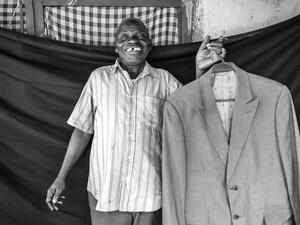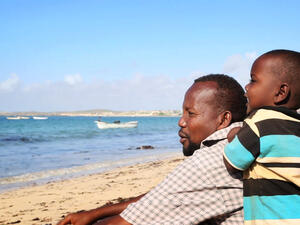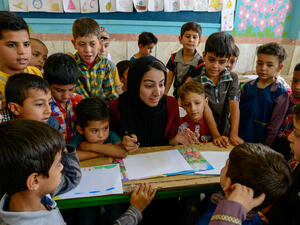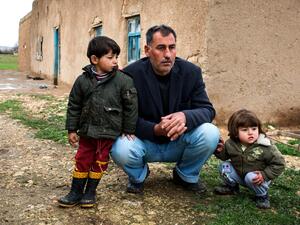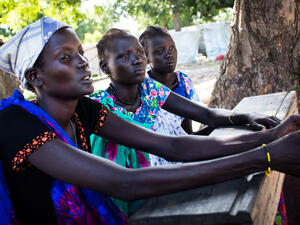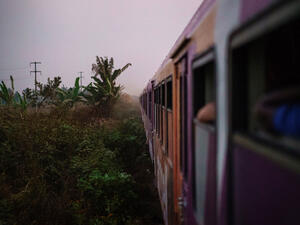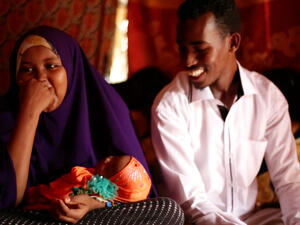We want to go home, say Congolese refugees in Angola
We want to go home, say Congolese refugees in Angola

Sungui settlement is located on fertile land. Refugees have what they need, but what they really want is to go home to the Democratic Republic of the Congo.
SUNGUI SETTLEMENT, Angola, April 7 (UNHCR) - Refugees invariably tell tales of hardship and suffering. Mbafu Nawej's story, however, is hard to believe even for seasoned aid workers. The Congolese refugee has been seeking a safe haven in Angola since 1977, but war followed him wherever he went and he had to flee again and again, travelling across the country in search of safety. Now he has only one wish left - to go home to the Democratic Republic of the Congo (DRC).
Nawej and his Angolan wife Elisa Camiao are living in Sungui settlement, 50 km north of the Angolan capital, Luanda. Sungui is a remote place on the premises of a former sugar cane plantation. The settlement houses some 200 Congolese refugees, most of them elderly people.
So far, 26 families from Sungui have expressed an interest in repatriating to the DRC. UNHCR Luanda is liaising with the Embassy of the DRC to obtain travel documents for them. Today the refugees have their pictures taken for that process.
"For us Africans, it is a disgrace to die in a foreign land. We need to be buried next to our ancestors so our souls can rest in peace," says one of the old men in the queue as the others nod in approval.
The refugees in Sungui have had difficult lives. As young men, they fled during the so-called Shaba War, crossing from Katanga province in the DRC into Angola in 1977. Initially they stayed close to the border of Moxico province, which proved to be dangerous. So the Angolan government relocated them to a camp further inland in Lunda Sul.
Here, they were safe from the war in the DRC, but the civil war in Angola was unfolding. Fighting caught up with the Congolese refugees in 1982 and they had to flee to Kwanza Sul, travelling from eastern to western Angola. Here, the finest period of Nawej's life began. He fell in love with Camiao, a local girl. They got married and had five children.
For more than one decade, the Congolese community lived in peace. Together with the local population, they cultivated the land and sold their produce in town markets. "I am a good worker," says Nawej. "Give me land and tools and I will always have enough to feed my family."
However, the situation deteriorated as the frontline drew nearer in the mid-'90s. Fighters from the Union for the Total Independence of Angola (UNITA) started raiding the settlement. "They would come to the village and request food. They took the lorry we had from UNHCR for bringing the produce to the market. They stole the tractor," Nawej recalls.
By 1997, the situation was unbearable. "We did not have any food left. But the soldiers beat us up if we had nothing to give them."
As the settlement was located beside a river that divided UNITA from government territory, the refugees decided to flee, pulling a rope across the river in the absence of a bridge.
Camiao, who remained silent throughout our meeting, now starts talking, overwhelmed by the painful memories. "I know how to swim, so I crossed the river by myself. And I prayed to God that Mbafu and the children would make it.
Her husband tied the children to his body and brought them across while holding on to the rope. Everybody survived the passage and after two days of walking, the group reached the town of Conde where UNHCR was already waiting.
The refugee families were brought to Boa Esperança camp in Bengo province. Five years later, the war caught up with them again. After a fierce UNITA attack in 2001, they had to run for their lives. On foot, they marched 25 km south to Luanda.
At that time, the Angolan capital was already overcrowded with internally displaced persons from many parts of the country. The new arrivals were put up in makeshift huts beside the Kofangondo river. "Those were very hard times," Camiao remembers. "During the rainy season, our settlement used to be flooded up to our knees."
After the Angolan peace agreement of 2002, the government started decongesting Luanda, and as part of that operation, the Congolese refugees were brought to Sungui settlement in 2003.
Here they grow vegetables and fruits and catch fish in a little lake nearby. They have sufficient food and clean water. The few children in the settlement go to a public school. There is a nurse in the settlement. "We live in peace here and we get by," says Nawej. "But what we really want is to go back home."
UNHCR has made several attempts to repatriate the Congolese refugees. However, after nearly 30 years of exile, there are a number of problems.
The Congolese government cannot cope with additional returnees unless their families in the DRC take care of them. The authorities insisted that the refugees' families be traced prior to their return - a difficult task after such a long time in exile.
Some relatives died, children grew up, moved to new places, the refugees say. But they are not worried: "In our tradition, we have strong family ties. Once we are there, we will easily find our kin."

After a life of hardship, Mbafu Nawej wants to repatriate with his Angolan wife.
It seems that the refugees' determination convinced the Congolese authorities. Repatriation will start even for those who have not established contacts with their families yet.
This is why the inhabitants of Sungui settlement are queuing happily to have their names registered and their pictures taken for their next voyage. This time it is going to be a voluntary and joyful journey.
By Melita H. Sunjic in Sungui settlement, Angola


